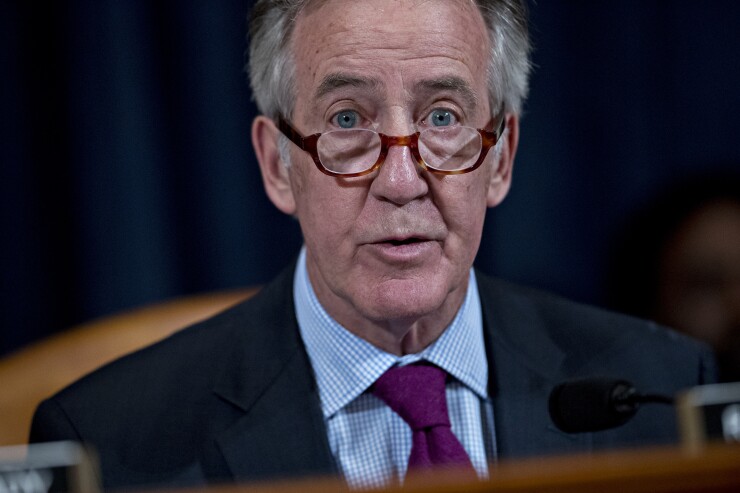WASHINGTON – Efforts to save the federal deduction for state and local taxes could continue during the week of Nov. 6 and whatever agreement is reached could be added to House tax reform legislation.

House Ways and Means Committee Chairman Kevin Brady, R-Texas, told The Bond Buyer on Thursday that he will continue to work on a solution that prevents taxes from increasing on families in every state.
Brady said, if an agreement on SALT isn’t reached by the Nov. 1 release of the House Republican tax plan, a fix will be offered as an amendment during the committee vote on the bill
House Republicans from New York and New Jersey failed to attract sufficient allies from within their party on Thursday in an attempt to preserve the SALT deduction.
The House approved its 2018 budget resolution in a close 216-212 vote that clears the way for Republicans to vote on a tax reform bill before Thanksgiving.
House Republicans will unveil details of their tax legislation on Nov.1, whether or not they have resolved the lingering disagreement among members over the fate of the SALT deduction.
Twenty Republicans voted against the budget resolution, including 11 from New York and New Jersey who objected to the proposed repeal of the SALT deduction. Another no vote came from Republican Rep. Mark Sanford of South Carolina, a former governor.
Governors, mayors and municipal officials from around the nation are opposing the repeal of the deduction, arguing that it would allow double taxation and restrain the ability of state and local governments to raise revenue.
Federal taxes would increase for middle-income homeowners in many zip codes around the country if the SALT deduction is repealed, according to a database compiled by the Government Finance Officers Association.
But most House Republicans who have these zip codes within their districts have stood by their party leaders on repealing the deduction, including all 14 GOP members of the California delegation.
Rep. Tom MacArthur of New Jersey, who has been the most outspoken Republican opposed to the SALT deduction repeal, said it would compound the inequity for residents of his state who already pay $31 billion more in federal taxes than they get back. Putting it another way, MacArthur said residents of his state get back only 61 cents for every $1 they pay the federal government while West Virginia gets $2.07 on every dollar.
“So it’s very easy for these states where the federal government is supporting 40% of their budget to say these Northeastern states lost this benefit,” he said. “But we’re the ones supporting their budget and I think that’s just not fair.”
Two New Jersey House members announced Thursday that they are introducing bipartisan legislation to address the tax inequity among the states. Reps. Leonard Lance, R-N.J., and Josh Gottheimer, D-N.J., are proposing refundable tax credits to residents of states such as New Jersey, New York, Connecticut and Illinois that pay more in federal taxes than they get back.
Their bill, the Return on Investment Accountability Act, has been dubbed the “Anti-Moocher Bill.”
MacArthur said Vice President Michael Pence assured him in a meeting earlier in the week that the administration is committed to cutting taxes for the middle class.
House Republicans hope to finish work on the tax reform legislation the week of Nov. 13.
Meanwhile, Senate Finance Committee Chairman Orrin Hatch, R-Utah, has not announced a target date for releasing his panel’s detailed tax plan or beginning a markup of legislation.
“Chairman Hatch intends to lay down a mark for the committee to advance in the coming weeks,” committee spokeswoman Julia Lawless said. “Details will be released when finalized.”
The Senate’s tax legislation is expected to be different from the version the House considers, although congressional Republicans and the administration have agreed to a general framework.

House Democrats released their tax reform framework Wednesday that included several bond-related infrastructure provisions.
“We’ve come to the conclusion we need a big infrastructure program,’’ Rep. Richard Neal of Massachusetts, ranking Democrat on the Ways and Means Committee, told The Bond Buyer on Thursday. Neal said Democrats plan to offer infrastructure additions to the tax plan as committee amendments next month.
President Trump has called for $1 trillion in new infrastructure spending over the next decade, but his administration is holding back on releasing details of its plan until after tax reform.
“The White House keeps saying it’s going to be a big one,” Neal acknowledged, adding that National Economic Council Chair Gary Cohn said Wednesday that it will include an increase in the federal gasoline tax.
“We’ll see,” Neal said.
The Democrats' principles for tax reform and infrastructure called for making Build America Bonds permanent as well as maintaining and expanding tax-exempt bond financing.
It also called for leveraging private investment to create public-private partnerships for infrastructure, making the New Markets Tax Credit program permanent and enhancing the low-income housing tax credit and historic tax credit.





